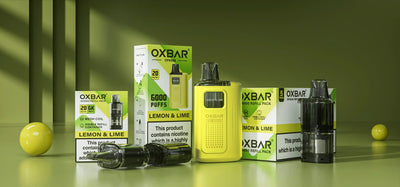Do Vapes Contain Calories? The Facts on Vaping and Weight Gain
In the world of vaping, a common curiosity revolves around whether e-liquids contain calories and, if so, whether those calories could affect one’s weight. With vaping’s rising popularity, some individuals worry about its potential impact on diet and weight gain. This article clears up the myths about calorie intake from vaping, shedding light on what’s actually inside e-liquids, how calories in vape juice compare to dietary calories, and why vaping won’t affect your weight. For affordable and high-quality vaping products, explore the range at Vape Offers.
How Many Calories Are in Vape Juice?
Vape juice typically contains about 5 calories per millilitre. However, it’s important to remember that these calories are only absorbed through the digestive system, not the lungs. The calorie content in vape juice primarily stems from its main ingredients: vegetable glycerin (VG), propylene glycol (PG), food-grade flavourings, and, in some cases, nicotine. Let’s break down these components and see how they contribute to vape juice’s caloric content.
Understanding Vape Juice Ingredients
1. Vegetable Glycerin (VG) and Propylene Glycol (PG)
VG and PG make up over 90% of most e-liquids. Vegetable glycerin, a common additive in food products, has roughly 4.32 calories per gram, while propylene glycol has around 4 calories per gram. VG is slightly denser than PG, meaning it has a slightly higher caloric density. For a standard 2 ml vape tank filled entirely with VG, there would be about 10.9 calories—this is the highest calorie content you’d encounter in a vape, even in larger vape tanks.
2. Flavourings
Food-grade flavourings add taste to vape juice but contribute minimally to its caloric value. In vape juices, flavours generally make up around 10% of the total volume. Some flavours use alcohol-based carriers, which have a higher calorie count of 7 calories per gram. However, as these components are present in minimal quantities, their caloric impact on the vape juice is insignificant. The actual calories derived from flavours in vape juice are so low they’re practically negligible.
3. Nicotine
Nicotine, if present, adds no calories to vape juice. Whether your vape juice contains nicotine or is nicotine-free, it won’t impact the calorie content of the liquid.
Do You Absorb Calories by Vaping?
The short answer is no. While vape juice does contain a minor caloric value, you don’t absorb calories when inhaling e-liquid. Calories are only absorbed when digested, not inhaled through the lungs. Since vaping does not involve the digestive system, the calories in vape juice do not enter the bloodstream or affect your caloric intake. Therefore, the calories in vape juice are irrelevant in terms of weight gain.
Inhaling e-liquid vapour might result in trace amounts of condensation in the mouth, which could then be swallowed. However, this would be in such small amounts that measuring its caloric impact would be virtually impossible.
Can Vaping Contribute to Weight Gain?
Since calories from vape juice don’t enter your digestive system, they have no influence on weight gain. When comparing the calories in vape juice to those found in food, it’s clear that even the theoretical caloric intake from vaping is inconsequential. To maintain or lose weight, it’s essential to focus on the calories you consume through food and beverages, not those in vape juice. You can explore disposable vape options that are budget-friendly and calorie-free in the practical sense.
Can Vaping Help with Weight Loss?
While vaping isn’t a weight-loss tool, it can sometimes indirectly help reduce calorie intake. Some vapers find that enjoying a flavoured vape can help curb cravings for sweets or snacks, which may lead to lower calorie consumption if vaping is chosen over snacking. Sweet and fruity e-liquids can simulate dessert flavours, which could help in avoiding unnecessary snacking.
However, it’s crucial to remember that vaping is not a substitute for a balanced diet or an active lifestyle. Weight loss requires burning more calories than you consume through dietary adjustments and physical activity, which vaping alone cannot achieve.
Final Thoughts: Vaping and Caloric Intake
The calorie content in vape juice is so minimal that it’s essentially irrelevant to your overall diet and weight management. Since calories from vape juice aren’t absorbed through inhalation, they cannot lead to weight gain. If you’re thinking about transitioning from smoking to vaping, you don’t need to worry about calories affecting your weight. However, if you’re seeking ways to manage your weight, focusing on a healthy lifestyle, balanced diet, and regular physical activity is essential. For a variety of e-liquid flavours that won’t impact your calorie intake, check out Vape Offers’ selection of e-liquids.
Switching to vaping from smoking is a personal choice, but it’s helpful to know that it won’t have any measurable impact on your caloric intake. The key takeaway? Vaping is calorie-free in terms of practical dietary impact.


